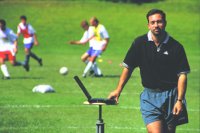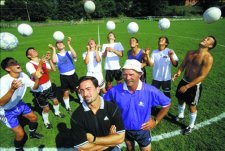Mind Game

By ROBERT HILL
In the aftermath of Coach Horst Richardson's first losing men's soccer season in nearly 25 years, he brought in the San Diego performance consultants, Enhanced Performance Systems. EPS has a compelling roster of clients, including the Navy Seals, the Italian Olympic Training Center, the Boston Bruins, U.S. Skiing, and the Institute for Physical Culture (Leningrad).EPS also has Marc "Chip" Sagal '89, a Tiger soccer alumnus. Sagal parked himself in the press box on Stewart Field for two days of pre-season practice, perched on a metal folding chair in worn soccer cleats, and plugged psychological inventories of team members and coaches into his laptop.
"Emotionally, Horst had trouble with that himself," Sagal says of the coach's tough last year. "He recognized that a better understanding of the players and of the psychology behind performance might be helpful." Considering that half the team this year is first-year students, performance psychology could be critical.
Sagal, a Phi Beta Kappa philosophy major, knows CC soccer and he knows Horst Richardson -- better now than when he played for him. "Our expertise," he explains of EPS, "is in identifying the personality related factors -- things like how people pay attention, their control needs, social needs, interpersonal factors - and seeing how these influence the performance environment.
"Positions in soccer require different styles of attention. If you play center, in midfield, you have to have a Zen awareness. You have to know where everybody is on the field and maintain your vision under pressure. As a forward, what's important is aggressiveness, focus -- a different style of attention.
"We start a bit farther back than that. We look at the attentional and interpersonal variables and ask, what kinds of mistakes is this person most likely to make? Under pressure, what is this person going to do? Is he going to try to think his way out of a problem? Say somebody's tackled in the latter stages of a game. Are they going to get angry, is their attention going to narrow, are they going to retaliate or are they going to withdraw? People react in a variety of ways and my job is to help predict those things."
Sagal administered a battery of tests to players and coaches to arrive at individual profiles and a larger composite picture, "as if the team itself were a person." He punches some numbers into his laptop and gazes at gray bars across the screen, intersected by irregular black bands in a crazy graph. "They are free-spirited creative guys, very bright, whose preference is to think their way out of things as opposed to reacting. That's a great thing, but it isn't always a great thing on the field. The game of soccer is played out on the field, it's not played in somebody's head. That will be a challenge.
"Intellectually expressive -- they'll speak their minds. They make their own rules, but that makes it difficult for them to coalesce. It's a group that likes to be in control, a group that feels good about themselves. You've got a team that enjoys a lot going on in their lives. It's not just soccer that's the be-all and end-all. School is important, family is important, relationships, philosophizing are all part of their lives.
"In terms of bringing them to see the same page and work together, it's a little bit contrary to their mentality," Sagal concludes. "I told Horst he may have one of the toughest coaching jobs in America, given the types of players that are attracted to this school."
Richardson also completed the inventory. "When I put Horst's profile up, I saw the light dawn on the players. They saw what his tendencies are, where the conflicts are. I saw the nods, the team saying, that's exactly what happens." Richardson, like his team, is a thinker. "He's very strategic, his mind is going all the time, coming up with new ideas, almost on a second-to-second basis." The team may need time to adjust and absorb, while their coach's tendency is to overload them with new ideas to think about and learn. "They need a simple plan, not 10 things, but two. It's then up to the coach to simplify."

What he is doing for the team now may have turned the tide for his own team a decade ago, Sagal muses. "If I had had an opportunity to learn a little bit more about Horst and some of my teammates, it might have made just the little bit of difference that we needed to take it up a notch."
What's the path from an undergraduate degree in philosophy to a career in sports psychology? "I was accused by [philosophy professor] Judy Genova of being the living embodiment of the mind-body problem," he laughs. "I lived a life of intellectual pursuits. My father was a philosophy professor, so I grew up with that. My mother was a psychologist. I also had an incredible love for sport, particularly soccer. So my life was always divided between my life on the field and my life in the classroom. It took a long while before I could figure out how to mend those two things. One day my father tossed me a book called 'Sports Psychology.' I thought, here's a way I can combine my love for soccer and coaching with my love for the mind. All of a sudden, a light went on for me."
In that book was an article by Dr. Robert Nideffer, the founder of EPS. At the time, Sagal thought how engaging it would be to work for a company that did this kind of consulting. Eight years later, with a master's degree from San Diego State, he met Nideffer at a seminar. The next year, Nideffer offered him a job. "Now five years have passed and I'm basically helping him run the company," says Sagal, who has co-authored a book with Nideffer on psychological assessment in sport.
Still, he hasn't entirely solved the mind-body problem. "Here I am, trying to get feedback and I've got my cleats on. I'd rather be out on the field, playing."
Chip Sagal and EPS can be contacted at www.enhanced-performance.com. If you'd like to complete your own performance inventory, take a look at www.takeace.com.
Photos by Sean Cayton '94
Back to Index